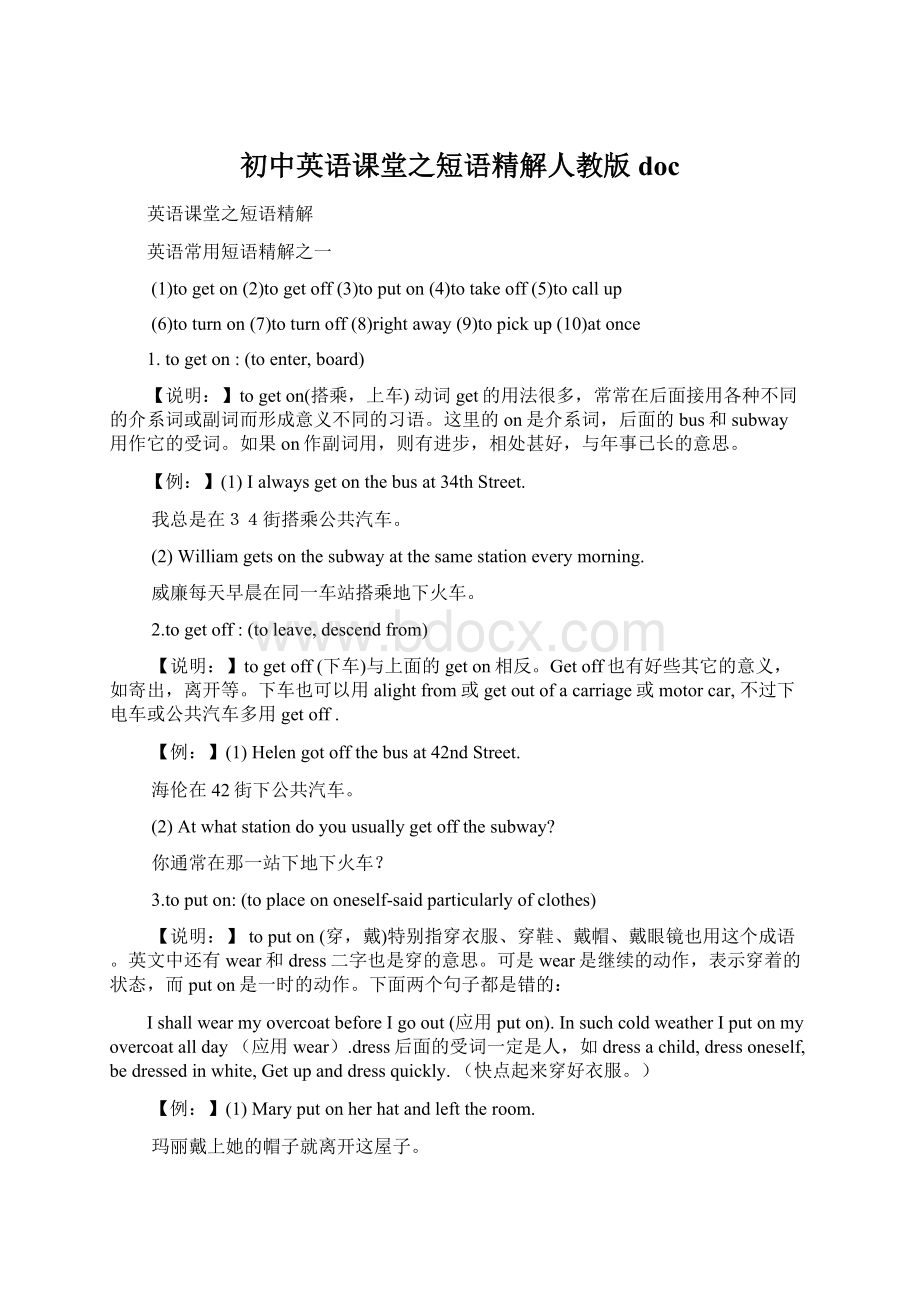初中英语课堂之短语精解人教版docWord文档格式.docx
《初中英语课堂之短语精解人教版docWord文档格式.docx》由会员分享,可在线阅读,更多相关《初中英语课堂之短语精解人教版docWord文档格式.docx(15页珍藏版)》请在冰豆网上搜索。

海伦在42街下公共汽车。
(2)Atwhatstationdoyouusuallygetoffthesubway?
你通常在那一站下地下火车?
3.toputon:
(toplaceononeself-saidparticularlyofclothes)
】toputon(穿,戴)特别指穿衣服、穿鞋、戴帽、戴眼镜也用这个成语。
英文中还有wear和dress二字也是穿的意思。
可是wear是继续的动作,表示穿着的状态,而puton是一时的动作。
下面两个句子都是错的:
IshallwearmyovercoatbeforeIgoout(应用puton).InsuchcoldweatherIputonmyovercoatallday(应用wear).dress后面的受词一定是人,如dressachild,dressoneself,bedressedinwhite,Getupanddressquickly.(快点起来穿好衣服。
)
(1)Maryputonherhatandlefttheroom.
玛丽戴上她的帽子就离开这屋子。
(2)WhyisJohnputtingonhishatandcoat?
约翰为什么穿衣戴帽呢?
4.totakeoff:
(toremove-saidalsoofclothes)
】totakeoff(脱去)与puton的意义相反,指脱去衣物鞋帽.民可以用putoff,但较不通用。
(1)Johntookoffhishatasheenteredtheroom.
约翰在这屋时脱下他的帽子。
(2)IsHelentakingoffhercoatbecauseitistoowarmintheroom?
海伦是不是因为室内太暖和而脱去她的外衣呢?
5.tocallup:
(totelephone)
】tocallup(打电话给……)后面一定要有受词,也就是接电话的人。
如果受词是代名词的话,常插在call与up之间。
】
(1)IforgottocallupMr.JonesyesterdayalthoughIpromisedtocallhimupexactlyatthreeo’clock.
我昨天忘记打电话给钟斯先生,虽然我答应了在三点钟的时候打电话给他的。
(2)DidanyonecallmeupwhileIwasout?
我出去的时候有人打电话来找我吗?
6.toturnon:
(tostart,begin)
】toturnon(扭开,打开)指扭开电灯,电炉,电扇,煤气等的按钮或开关,以及自来水的水龙头等而言。
开电灯也可以用putonthelight.
(1)Pleaseturnonthelight.Thisroomisdark.
请你扭开电灯,这房间太黑暗了。
(2)Someoneturnedontheradiatorinthisroomwhilewewereout.
我们外出时,有人把房内的电炉扭开了。
7.toturnoff:
(tostop,terminateextinguish)
】toturnoff(关闭,停止)指扭熄电灯,关闭无线电、自来水等。
关灯也可以用putoutthelight.
(1)Pleaseturnoffthelight.Wedonotneeditnow.
请把电灯关了,我们现在不需要它。
(2)ShallIturnofftheradioorareyoustilllisteningtoit?
我可以把收音机关掉吗,你是不是还要收听呢?
8.rightaway:
(immediately,atonce,verysoon)
】rightaway(立刻,马上)为美国口头语,没有immediately与atonce正式,系一副词片语,与rightnow(exactlynow)的意思相仿。
(1)Shesaysthatdinnerwillbereadyrightaway.
她说晚餐马上就准备好了。
(2)CanWilliamcometomyofficerightaway?
威廉能够立刻就到我的办公室来吗?
9.topickup:
(totake-especiallywithfingers)
】topickup(拾起,拣起)尤指用手指把东西拿起业而言。
Topickup还有很多其它的用法。
如
①让人搭便车:
Themotoristpickedupacoupleofservicemenalongthehighway.
(这个乘汽车的人在公路上让两个军人搭乘便车。
)
②听会,自然学会,(言语,游戏等):
HeneverstudiedFrench;
whatheknowshepickedupwhilelivinginFrance.
(他从来没有学过法文;
他所知道的是他住在法国的时候听会的。
③捉住,逮捕,萍水相逢便行订交,选出:
IpickedupLondonlastnight.
(昨晚我在无线电听到了伦敦的播音。
(1)JohnPickedupthenewspaperwhichwasonhisdesk.
约翰把书桌上的报纸拿了起来。
(2)Whydidn’tyoupickupthatpencilwhichlayonthefloor?
你为什么不把地板上的那枝铅笔拾起来呢?
10.atonce:
(immediately,verysoon,rightaway)
】atonce(立刻,马上)为一级通用的副词片语,也可以作为同时(simultaneously)解,如:
Thisbookisatonceinterestingandinstructive.(此书既有趣又有益。
(1)Heaskedmetocometohisofficeatonce.
他请我立刻就到他的办公室去。
(2)Iwantyoutosendthistelegramatonce.
我希望你马上把这电报发出去。
英语常用短语精解之二
(1)towaitfor
(2)atlast(3)asusual(4)tofindout(5)tolookat(6)tolookfor
(7)allright(8)righthere(9)littlebylittle(10)tiredout(11)tocallon
(12)Nevermind
1.towaitfor:
(toexpect,await)
】towaitfor(等候,期待)可以说等于await,wait通常都作不及物动词用,如果后面有受词,切不可少用介系词forawait为及物动词,后面不可用介系词,但是没有wait普遍。
Wait也可用作及物动词,如:
1waitone’schance或opportunity(等机会);
2Don’twaitdinnerforme.(晚饭不要等我)
】
(1)WewillwaitforyouonthecornerofBroadwayand86thStreet.
我们将在百老汇及86街转角处等你
(2)Wewaitedforhimformorethananhourandfinallyleft.
我们等了他一个多小时,然后才离开。
2.atlast:
(finally)
】atlast(最后,终于)为一副词片语,与atfirst意义相反。
也可以用atlonglast,可是语气较强,而且有点英国味道。
(1)WewaitedandwaitedandatlastJohnarrived.
我们等了又等,后来约翰终于来了。
(2)Hashefinishedthatworkatlast?
他最后把那工作做完了吗?
3.asusual:
(asalways,customarily)
】asusual(照常,照例,仍然)作副词用,其意为asis(was)usual和往常一般。
usual是形容词,不可用usually.
(1)Henryislateforclassagainasusual.
亨利像平常一样上课又迟到了。
(2)AsusualHelenwonfirstprizeintheswimmingcontest.
海伦在游泳比赛中仍然获胜。
4.tofindout:
(togetinformation,discover,learn)
】tofindout(得悉,发现,查明)与find略有不同,findout指故意去寻而寻出。
(1)Iwasunabletofindoutthenameofthemanwhocalled.
我想不出那个打电话来的人的名字。
(2)Willyoupleasetrytofindoutformewhattimethattrainarrives?
能否请你替我查明火车什么时候到达?
5.tolookat:
(dodirecttheeyestoward,watch)
】tolookat(眼睛望着,注视)亦可解释为考虑,调查(consider,investigate),如:
Thejudgesaidthathewouldlookatthematterofthewidow’s
righttotheproperty.(法官说他将考虑寡妇对这财产的权利。
)look一般都用作不及物动作,与许多不同的介系词结合而形成各种意义不同的片误。
Lookat与see并不相同,see的意思是看到,往往是无意的,上面两句里的lookat都不可改用see。
(1)Theteachertoldustolookattheblackboardandnotatourbooks.
教师教我们注视黑板,不要看着我们的课本。
(2)Iliketowalkintheparkandlookatthestarsatnight.
晚上我喜欢在公园里散步,仰望着天上的群星。
6.tolookfor:
(tosearchfor,seek)
】tolookfor(寻觅,搜寻)也有期望,盼望的意思,如Idon’tlookformuchprofitfromthebusiness.(我并不期望从生意中得到优厚的利益。
(1)Hehasspentanhourlookingforthepenwhichhelost.
他已经花了一个钟头去寻找他失去的钢笔了。
(2)Ihavelostmygloves.Willyouhelpmelookforthem?
我的手套丢了,请你帮我找找好吗?
7.allright:
(satisfactory,correct)
】allright(满意,可以,没关系)用作形容词,和美国人的意思相仿,为日常口头语。
有很多的英美人用allright,可是也有许多人认为不该用它。
(1)Hesaidthatitwouldbeallrighttowaitinthisofficeforhim.
他说在这办公室里等他就好了。
(2)WillitbeallrightwithyouifIgiveyouthatmoneytomorrowinsteadoftoday?
如果我把今天应该给你的那笔钱明天给你,可以吗?
8.righthere,rightthere,rightnow,etc:
(exactlyhere,exactlythere,etc.)
】righthere(就在这儿),rightthere(就在那儿),rightnow(现在立刻)为日常口头语,right是副词,它的意思是exactlyprecisely,just,immediately,把here,there,now等的范围缩小了。
还有rightaway与rightoff都是立刻,马上的意思。
(1)Hesaidthathewouldmeetusrighthereonthiscorner.
他说他将在这转角处跟我们碰面。
(2)RightthenIsawveryclearlythathewasnottellingthetruth.
那时我就看得很清楚,他没有说实话。
(3)Let’sdoitrightnow.
让我们现在就做这件事吧!
9.littlebylittle:
(gradually,bydegrees,slowly)
】littlebylittle(逐渐,慢慢地)为副词片语,指每次都是一点,因而有逐渐,
慢慢地的意思。
(1)Ifyoustudyregularlyeachday,littlebylittleyourvocabularyofEnglishwordswillincrease.
如果你每天有规律地学习,你的英文字汇将逐渐增加。
(2)Hishealthseemstobeimprovinglittlebylittle.
他的健康似乎慢慢地好转了。
10.tiredout:
(extremelytired)
】tiredout(非常疲倦)为形容词片语,tired是由过去分词转成的形容词,表示
由于精力被消耗得很多,因而觉得疲倦。
Out是副词作thoroughly,completely,
entirely解,用以形容tired.
(1)Ihaveworkedveryhardtodayandamtiredout.
我今天很辛苦地工作,所以累极了。
(2)HewastiredoutafterhislongtriptoCalifornia.
至加利福尼亚州长途旅行归来后,他觉得非常疲倦。
11.tocallon:
(tovisit)
】tocallon(拜望,访问)意思是过访,小竭。
On也可upon后面的受词一定是人,如果访问某一个地方,则用callat.Callon还有好些别的意思,如
Hecalledonallhisfriendstohelphim.这儿的callon应解释为要求,求助于。
(1)Lastnightseveralfriendscalledonus.
昨晚有几个朋友来看我们。
(2)HowmanysalesmencallonMr.Evanseveryday?
每天有多少推销员拜访伊文思先生呢?
12.Nevermind:
(donotmind,donotpayanyattentiontoit.)
】nevermind(不要紧,不必介意)为礼貌用语。
Mind作动词用作介意解。
(1)“Nevermind!
”shesaidwhenIofferedtoopenthewindowforher.
当我提出要为她打开窗子时,她说,不要紧!
(2)whenWilliamwishedtoreturnthemoneywhichheowedyouwhydidyousay:
“Nevermind!
Whatuntilnextweekwhenyoureceiveyoursalary.”
当威廉要还他所欠你的借款时,你为什么说:
“不要紧!
等到下星期你领到薪水再还好了”。
英语常用短语精解之三
(1)topickout
(2)totakeone’stime(3)totalkover(4)toliedown
(5)tostandup(6)tositdown(7)alldaylong(8)byoneself(9)onpurpose
(10)togetalong(11)tomakenodifference(12)totakeout
1.topickout:
(tochoose,select)
】topickout(挑选,拣选)多指购物时的挑选而言。
out用作副词,形容及物动词pick.
(1)IwanttopickoutsomenewtiestogiveasChristmaspresentstomyfriends.
我要选些新领带,送给我的朋友们作为圣诞礼物。
(2)whichbookdidyoupickouttosendtoHelen?
你挑选了那一本书给海伦呢?
2.totakeone’stime:
(toworkorgoleisurely,nottohurry)
】totakeone’stime(从容不迫,慢慢来)指有足够的时间,尽可慢慢的去做,time的后面可以跟现在分词,如例一中的doing,作为主词补语;
也可以跟in,接着用一名词或动名词作为in的受词如例二。
(1)thereisnohurry.Youcantakeyourtimedoingthatwork.
不要忙,你可以慢慢地去做那个工作。
(2)williamneverworksrapidly.Healwaystakeshistimeineverythingthathedoes.
威廉做事从来不匆忙,他总是从从容容地做每一件事。
3.totalkover:
(todiscuss.Consider)
】totalkover(讲座,商量)指讲座、会商尚未实施的计划或问题,或以商谈说服,使别人赞成自己的计划。
后面的受词如果是名词,应放在over之后,如果是代名词,则放在over之前,如Myhusbandtalkedmeover.(我的丈夫说服了我。
(1)WetalkedoverMr.Reese’splanbutcouldnotcometoadecision.
我们讨论过李斯先生的计划,可是尚未获得结论。
(2)Withwhomdidyoutalkoveryourplantobuyanewcar?
你跟谁讨论你买新车的计划呢?
4.toliedown:
(torecline,takealyingposition)
】toliedown(躺下,横卧)指躺在床上或睡椅上休息而言。
Lie是不及物动词,down是副词。
(1)Ifyouaretired,whydon’tyouliedownforanhourorso?
如果你累了,你为什么不躺下来休息一小时呢?
(2)ThedoctorsaysthatGracemustliedownandrestforanhoureveryafternoon.
医生说葛丽斯每天下午必须躺下来休息一小时。
5.tostandup:
(torise,takeanuprightorstandingpositionafterbeingseated)
】tostandup(起立)指从坐下的姿势转取直立或站着的姿势而言。
(1)WhenthePresidententered,everyoneintheroomstoodup.
总统进来时,室内每个人起立。
(2)Whenthe“Star-SpangledBanner”isplayed,everyonemust